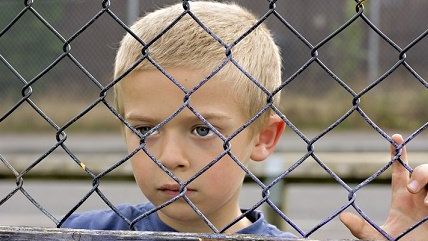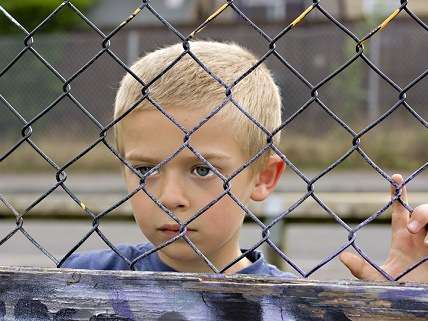Schools Treat Mild Misbehavior Like Capital Crime. It Has to Stop.
Won't someone please think of the children?


A new study from the Center for Public Integrity offers a sobering look at the War on Childhood that is currently underway in American public schools. Administrators routinely treat mild disobedience from students as a criminal matter requiring police intervention, resulting in life-wrecking felony charges for kids—many of them black and Latino.
Consider the story of 11-year-old Kayleb Moon-Robinson:
Diagnosed as autistic, Kayleb was being scolded for misbehavior one day and kicked a trash can at Linkhorne Middle School in Lynchburg, Virginia, in the Blue Ridge Mountains. A police officer assigned to the school witnessed the tantrum, and filed a disorderly conduct charge against the sixth grader in juvenile court.
Just weeks later, in November, Kayleb, who is African-American, disobeyed a new rule — this one just for him — that he wait while other kids left class. The principal sent the same school officer to get him.
"He grabbed me and tried to take me to the office," said Kayleb, a small, bespectacled boy who enjoys science. "I started pushing him away. He slammed me down, and then he handcuffed me."
In an incident report, a teacher confirmed that the officer spoke to Kayleb, then grabbed him around the chest, and that Kayleb cursed and struggled. School officials won't comment on this case, but say that police in schools are crucial to providing a safe atmosphere and protecting against outside threats. Stacey Doss, Kayleb's mother and the daughter of a police officer herself, was outraged.
Educators stood by, she said, while the cop took her son in handcuffs to juvenile court. The officer filed a second misdemeanor disorderly conduct complaint. And he also submitted another charge, a very grown-up charge for a very small boy: felony assault on a police officer. That charge was filed, Doss said the officer told her, because Kayleb "fought back."
"I thought in my mind — Kayleb is 11," Doss said. "He is autistic. He doesn't fully understand how to differentiate the roles of certain people."
Instead of teaching Kayleb to be respectful of authority figures and attentive to his surroundings, the public school system has merely added to his problems.
CPI's study contains many interesting details relating to trends in the various states on police presence in schools. Kayleb attended school in Virginia, which is apparently one of the worst states for funneling kids from the public school system straight into the criminal justice system.
Libertarians who oppose government-run schools are often criticized by liberals for failing to "think of the children." While I don't pretend to speak for all libertarians, let me assure my liberal friends that I am indeed considering what's best for the children, and this isn't it.


Show Comments (32)